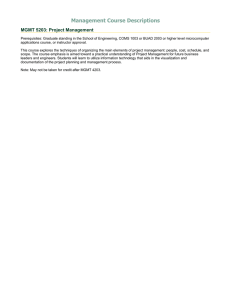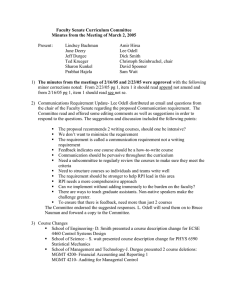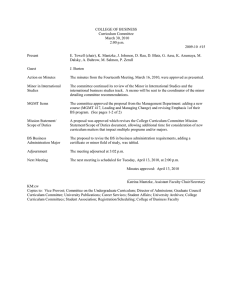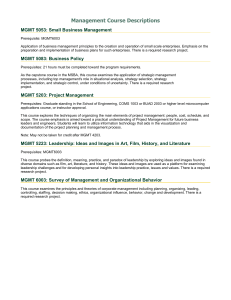Faculty Senate Curriculum Committee Minutes from the March 30, 2005 Meeting
advertisement
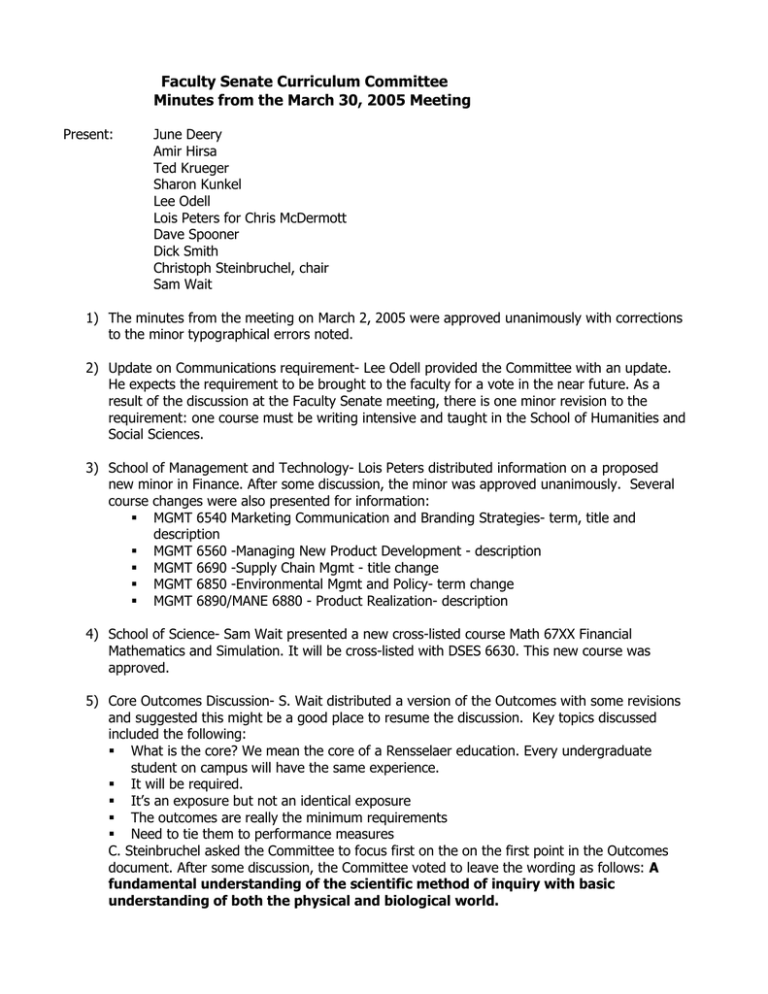
Faculty Senate Curriculum Committee Minutes from the March 30, 2005 Meeting Present: June Deery Amir Hirsa Ted Krueger Sharon Kunkel Lee Odell Lois Peters for Chris McDermott Dave Spooner Dick Smith Christoph Steinbruchel, chair Sam Wait 1) The minutes from the meeting on March 2, 2005 were approved unanimously with corrections to the minor typographical errors noted. 2) Update on Communications requirement- Lee Odell provided the Committee with an update. He expects the requirement to be brought to the faculty for a vote in the near future. As a result of the discussion at the Faculty Senate meeting, there is one minor revision to the requirement: one course must be writing intensive and taught in the School of Humanities and Social Sciences. 3) School of Management and Technology- Lois Peters distributed information on a proposed new minor in Finance. After some discussion, the minor was approved unanimously. Several course changes were also presented for information: MGMT 6540 Marketing Communication and Branding Strategies- term, title and description MGMT 6560 -Managing New Product Development - description MGMT 6690 -Supply Chain Mgmt - title change MGMT 6850 -Environmental Mgmt and Policy- term change MGMT 6890/MANE 6880 - Product Realization- description 4) School of Science- Sam Wait presented a new cross-listed course Math 67XX Financial Mathematics and Simulation. It will be cross-listed with DSES 6630. This new course was approved. 5) Core Outcomes Discussion- S. Wait distributed a version of the Outcomes with some revisions and suggested this might be a good place to resume the discussion. Key topics discussed included the following: What is the core? We mean the core of a Rensselaer education. Every undergraduate student on campus will have the same experience. It will be required. It’s an exposure but not an identical exposure The outcomes are really the minimum requirements Need to tie them to performance measures C. Steinbruchel asked the Committee to focus first on the on the first point in the Outcomes document. After some discussion, the Committee voted to leave the wording as follows: A fundamental understanding of the scientific method of inquiry with basic understanding of both the physical and biological world. Faculty Senate Curriculum Committee March 30, 2005 There was a lengthy discussion of the next statement concerning the “basic principles of calculus….” Discussion points included: Is it too specific, do we need a more general statement Maybe a more general language mathematical science with rigor We are a technological university and calculus is universal The issues are similar to use of term biological Rensselaer has a more diverse population (changing profile) which needs to be addressed Calculus means something different to all. In Architecture, there are more issues with probability and statistics Express the statement that college level math is what we want and all our graduates need to have this A core outcome is tied to mathematics Students develop cynicism about math if it’s not integrated in their curriculum We need to show leadership Should we approach the math dept for their insight Faculty must understand where assessment will take place. It will occur in the schools. This needs to be clear before the next vote In an IT survey of their alumni, the alumni reported back that they didn’t see the need when they took it but now they understand The Committee agreed on the following wording for Point 2:A fundamental grasp of continuous and discrete mathematics and an understanding of data analysis through exposure to the fundamental principles of probability and statistics. After some further discussion, the Committee approved the following statement to replace Point 3:A fundamental grasp of the methods social scientists and humanists use to explore cultural phenomena, and knowledge of the major concepts, models, and issues of at least one discipline in the social sciences and one in the humanities. The Committee discussed the use of the terms “appreciation” and with “exposure”. These terms make it difficult to measure the outcomes. It’s important to give legitimacy to management but can’t do it by adding a course or adding another requirement. L. Peters will develop the text on “organizations” for the next meeting. 2
